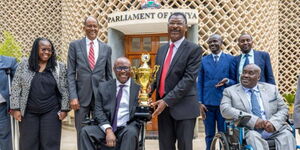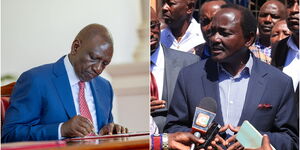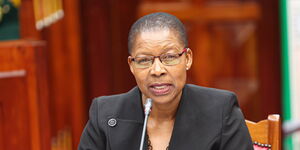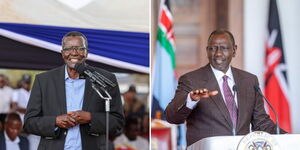The United Kingdom has thrown its weight behind Kenya's efforts to combat the thriving 'wash wash' cartels.
In a statement shared on X social media, the British High Commission in Kenya announced plans to help the country exit the dreaded international financial grey list. The grey list, which is managed by the Financial Action Task Force (FATF), puts a spotlight on the country.
Kenya landed on the grey list in February this year because of deficiencies in combating money laundering, terrorist financing, and proliferation financing.
The FATF is the global watchdog for anti-money laundering (AML) and counter-terrorism financing standards.
The task force evaluated Kenya's adherence to global standards and recommendations set in place for countries to allow combating money laundering and related financial crimes and found compliance shortcomings, leading to its graylisting.
Money laundering, often called 'wash wash,' continues to be a significant concern. A report from the Eastern and Southern Africa Anti-Money Laundering Group (ESAAMLG), which monitors the region's implementation of global measures against illicit funds, revealed that Kenya received a suspicious Ksh 72.2 billion in cash over the four years leading up to 2021, and the sources of this money were not adequately explained.
On Friday, November 29, the UK revealed that it will continue to provide Kenya with technical assistance and collaborate to implement FATF Standards and support Kenya's economic growth.
"Tackling money laundering and terrorism finance is vital to safeguard democracy and support economic growth. The UK is delivering on promises to provide Kenya with technical assistance and collaborate to implement FATF Standards," the statement revealed.
This is after Kenya requested the support of international partners, including the European Union (EU), the United Kingdom (UK), and the United States (US), in technical assistance support to develop capabilities for capacity-diverse actions and instruments in this dynamic environment.
"Collaboration and technical assistance from these partners will be crucial in our efforts to enhance our AML/CFT/CPF framework, strengthen our regulatory institutions, and expedite our exit from the grey list," the former Treasury CS, Njuguna Ndung'u, said in February 2024, when Kenya was listed.
On Wednesday, November 28, the United Nations Office on Drugs and Crime East Africa launched the UK-funded project to strengthen Kenya’s AML/CFT Framework aimed at helping Kenya exit from the list.
"Launch of the UK-funded project to strengthen Kenya’s AML/CFT Framework and help the country to exit the FATF grey list," UNODC wrote.
Some of the reasons that resulted in Kenya's grey listing included the failure to prosecute money laundering and terrorism financing crimes, a lack of regulations for cryptocurrencies and nonprofit organizations, and the absence of a robust risk-based approach towards anti-money laundering and countering terrorist financing.
Kenya joined Tanzania, South Sudan, Nigeria, South Africa, Mali, Mozambique, Senegal, Burkina Faso, and Cameroon on the list.












